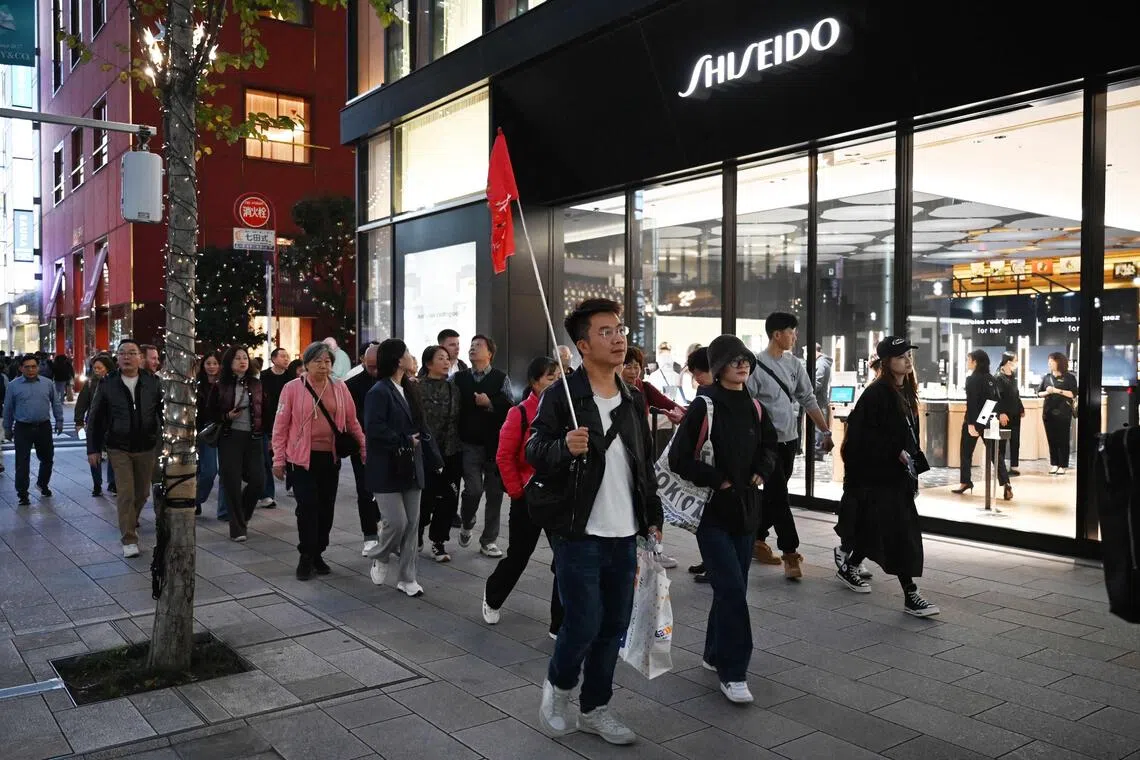Japan counts cost of China’s travel boycott as tensions flare
Sign up now: Get insights on Asia's fast-moving developments

Visitors from mainland China and Hong Kong account for around a fifth of all arrivals in Japan, official figures show.
PHOTO: AFP
TOKYO – Within days of China urging its citizens not to travel to Japan due to a diplomatic dispute, Tokyo-based tour operator East Japan International Travel Service had lost 80 per cent of its bookings for the remainder of the year.
The small firm, which specialises in group tours largely for Chinese clients, is at the sharp end of a backlash that threatens to deal a sizeable blow to Japan’s economy, the world’s fourth largest.
The travel warning – triggered by Japanese Prime Minister Sanae Takaichi’s remarks about Taiwan
“This is a huge loss for us,” said East Japan International Travel Service vice-president Yu Jinxin.
Tourism accounts for around 7 per cent of Japan’s overall gross domestic product, according to the World Travel & Tourism Council, and has been a major driver of growth in recent years.
Visitors from mainland China and Hong Kong account for around a fifth of all arrivals, official figures show.
The boycott could result in a loss of around 2.2 trillion yen (S$18.4 billion) annually, Nomura Research Institute estimates.
Tourism-related stocks in Japan have sunk since the warning was issued on Nov 14
Already more than 10 Chinese airlines have offered refunds on Japan-bound routes until Dec 31, with one airline analyst estimating around 500,000 tickets have already been cancelled.
No signs of imminent breakthrough
Ms Takaichi sparked the most serious diplomatic dispute in years between Asia’s top two economies when she told Japanese lawmakers in November that a Chinese attack on Taiwan threatening Japan’s survival could trigger a military response.
A wave of vitriolic responses by a Chinese diplomat in Japan and Chinese state media aimed at Takaichi prompted Japan to warn its citizens in China
Beijing has demanded Ms Takaichi retract her remarks, though Tokyo has said they are in line with the government’s position, suggesting no breakthrough is imminent.
China has also suspended the screenings of upcoming Japanese films
“China is like my second homeland to me and all my friends in China are my cherished family – I will always support One China,” Japanese singer Maria wrote on Weibo on Nov 18.
Tour operator Yu says her company has been able to weather past flare-ups between the neighbours, such as Tokyo’s decision to nationalise disputed islands in 2012 that triggered mass anti-Japan protests across China.
But a protracted crisis this time could be devastating, she said.
“If this lasts for one or two months, we can manage. But if the situation continues to worsen, it will obviously have a major impact on our business.” REUTERS


